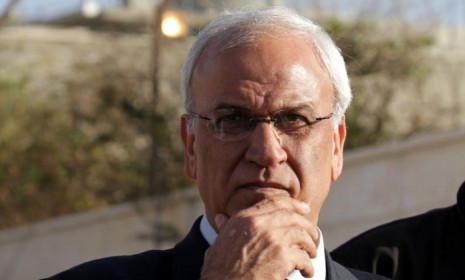The Palestine Papers: 4 key revelations
Leaked records of a decade of negotiations between Israel and the Palestinians could threaten the peace process. What do the papers reveal?

A free daily email with the biggest news stories of the day – and the best features from TheWeek.com
You are now subscribed
Your newsletter sign-up was successful
More than 1,600 confidential records of meetings between Palestinian, Israeli, and U.S. leaders have been leaked to media outlets, potentially dealing a dramatic blow to hopes for peace in the region. The papers, obtained by Arab TV channel Al-Jazeera and published in The Guardian, contain details that could "prove politically fatal" to the leadership of the Palestinian Authority, and may represent the "final nail in the coffin of the peace process." Here, the key things the papers reveal — and why they are so controversial:
1. Palestinians agreed to give over most of Jerusalem to Israel in 2008...
The revelation: The Palestinian leadership privately proposed that Israel annex all of its settlements in Jerusalem except one, reports The New York Times, contradicting its "long-standing protests against construction of Jewish developments" in the city. Israel, however, rejected the concession.
The Week
Escape your echo chamber. Get the facts behind the news, plus analysis from multiple perspectives.

Sign up for The Week's Free Newsletters
From our morning news briefing to a weekly Good News Newsletter, get the best of The Week delivered directly to your inbox.
From our morning news briefing to a weekly Good News Newsletter, get the best of The Week delivered directly to your inbox.
The fallout: This news left the credibility of the Palestininan Authority "in tatters," says M.J. Rosenberg in Talking Points Memo. The PA pretended to stand firm when it was "crushed by the combined weight of Israel and the U.S." — no Palestinian will ever trust those leaders again. The revelation also signals that Israel has essentially "no interest in the peace process no matter what they could receive," says David Dayen at Firedoglake. "How could Palestine ever negotiate with Israel after this release?"
2. ...and they used the Hebrew word for the city
The revelation: Chief negotiator Saeb Erekat reportedly said the concession detailed above would result in "the biggest Yerushalayim in Jewish history."
The fallout: Hearing Erekat agree to the concessions and using the Hebrew name of the city "will strike many as an act of humiliation," says Jonathan Freedland at The Guardian. Palestinians are already calling for Erekat's resignation.
A free daily email with the biggest news stories of the day – and the best features from TheWeek.com
3. The Palestinian president had to draw his own 'napkin map'
The revelation: In 2008, the Palestininan Authority offered to let Israel annex "virtually all" of the settlements in East Jerusalem, says Al-Jazeera, but Israel demanded "an even more aggressive land swap" — the annexing of more than 10 percent of the West Bank in exchange for farmland in the Gaza Strip and West Bank. Mahmoud Abbas, president of the PA, was not allowed to keep a copy of the map detailing Israel's demands, so he had to "sketch a copy by hand on a napkin."
The fallout: If the "power dynamic" is so skewed that Abbas was forbidden to even keep the map, says Nitasha Tiku at New York, it's "no wonder Benjamin Netanyahu didn't feel compelled to pick up the phone" when Palestinian negotiators called. What's more, says Tony Karon at Time, such concessions would be "widely greeted by Palestinians as a betrayal."
4. The Palestinians' 'ingratiating appeals' toward Israeli and U.S. leaders
The revelation: The papers reveal "ingratiating appeals" made by Palestinian leaders to their Israeli counterparts, reports The Guardian. The then-senior Palestinian negotatior, Ahmed Qurei, told Tzipi Livni, Israel's foreign minister, "I would vote for you" in the coming elections. Qurei also told Condoleezza Rice, then U.S. secretary of state, that "you bring back life to the region when you come." The papers also reveal that Mahmoud Abbas called Ariel Sharon "a friend" during a 2005 meeting — words which "would have caused outrage if they had been made known at the time."
The fallout: Such language shows a "level of deference and desperation," says Amjad Atalla at Foreign Policy, that may be the final straw for the Palestinian people. Look at what just happened in Tunisia. The idea that "change is no longer impossible" is a "new reality." Who knows what will happen next?
-
 How the FCC’s ‘equal time’ rule works
How the FCC’s ‘equal time’ rule worksIn the Spotlight The law is at the heart of the Colbert-CBS conflict
-
 What is the endgame in the DHS shutdown?
What is the endgame in the DHS shutdown?Today’s Big Question Democrats want to rein in ICE’s immigration crackdown
-
 ‘Poor time management isn’t just an inconvenience’
‘Poor time management isn’t just an inconvenience’Instant Opinion Opinion, comment and editorials of the day